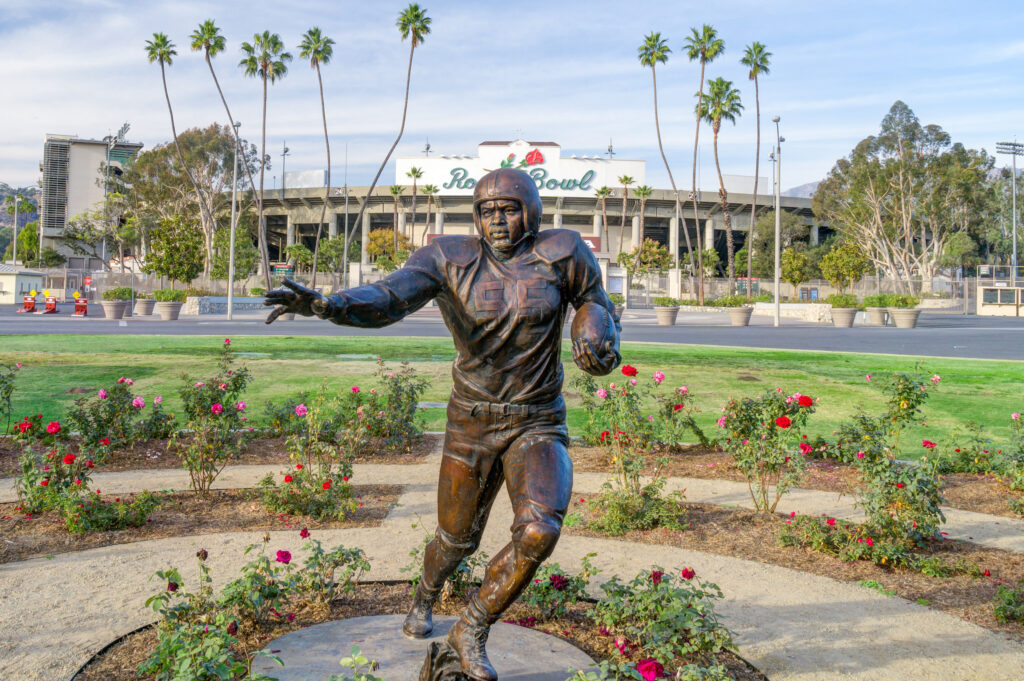Groundbreaking baseball player Jackie Robinson inspired generations of children with his astonishing talent in addition to his drive for success and justice — but where did such an inspiring man grow up?
Jackie Robinson grew up in Pasadena, California. However, he was born in Cairo, Georgia; his mother moved him and his siblings to the coastal state in 1920.

As the first black baseball player to break through the barrier of segregation that had poisoned the major leagues, Jackie Robinson’s legacy serves as an inspiration to many.
Early Life and Military Career
Jackie Robinson was born in 1919 as the youngest of five children. His family worked as sharecroppers in Georgia, but when his father left the family, his mother Mallie Robinson moved the family to sunny Pasadena.
Although Jackie Robinson enjoyed playing a variety of sports (a family trait, as his brother Matthew was an Olympic silver medalist), he could not participate in many activities due to his family’s relative poverty compared to the affluent area where they lived.
Still, Jackie Robinson threw himself into his love of sports and earned varsity letters in four sports; baseball, basketball, football, and track in high school and whilst attending the University of California, Los Angeles. He was the first to do so at UCLA.
He left college before graduating and was eventually drafted into the U.S. Army, although he never saw combat. During boot camp, Jackie Robinson was arrested after he refused to sit at the back of a segregated bus; although he was acquitted, living through this horrible act of racism shaped how he responded to the racism he would later face while playing Major League Baseball.
Jackie Robinson eventually received an honorable discharge from the military and had a stellar reputation while there.
Baseball Career
Jackie Robinson began playing baseball professionally in baseball’s black league.
At the time, the major leagues were racially segregated; Branch Rickey, who was president of the Brooklyn Dodgers, asked Robinson if he would be the first to play on the otherwise white team in an effort to integrate baseball.
In their fateful conversation, Branch Rickey asked Jackie Robinson if he would ever fight back against all the racism he was sure to face, saying, “Robinson, I’m looking for a ballplayer with guts enough not to fight back.”
Jackie Robinson agreed. He was the first-ever black player in the league and was the target of intense racism and hatred – he had promised never to fight back and turn the other cheek, which would have required immense strength and restraint in the face of such harassment.
There were players on the Dodgers against integration, and Jackie Robinson was also subject to racial abuse from other teams and fans; he and his family received violent threats and were called abusive slurs.
Jackie Robinson persevered throughout all this racist abuse. In his first year on the team, he had a .297 batting average and 12 home runs.
The league soon chose Jackie Robinson as Rookie of the Year. He became a baseball icon and opened the doors for other black players to play baseball in the major league.
His Legacy
In addition to his outstanding baseball career, Jackie Robinson was also a civil rights activist. He was an active member of the NAACP and marched on Washington in 1963.
Rev. Martin Luther King Jr. said that Robinson was “a legend and a symbol in his own time.” Jackie Robinson died in 1972 at 53 years old.
People touched by his life’s work have honored his legacy in several ways.
His wife, Rachel Robinson, founded the Jackie Robinson Foundation, that offers scholarships to students.
In 2013 the biopic ‘42’ came out, with the late Chadwick Boseman portraying Robinson. The film delves into Jackie Robinson’s journey and received critical praise for its earnest and respectable depiction of the baseball legend. You can watch the trailer here:
The film gets its title from Jackie Robinson’s jersey number, which was 42. The MLB retired Jackie Robinson’s jersey number in 1997 as a sign of respect.
Jackie Robinson once said that “a life is not important except in the impact it has on other lives.” In life, his actions broke down barriers and created massive civil rights progress, and in death, his legacy has inspired countless others to continue this vital work.